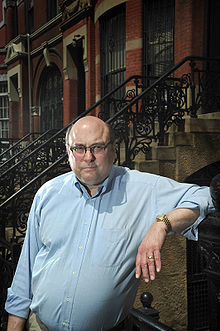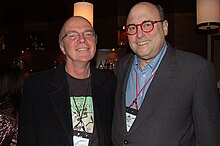Peter Straub
Peter Straub | |
|---|---|
 Straub in 2009 | |
| Born | Peter Francis Straub March 2, 1943 Milwaukee, Wisconsin, U.S. |
| Occupation | Novelist, poet |
| Nationality | American |
| Alma mater |
|
| Genre | Horror |
| Notable awards | Bram Stoker Award, World Fantasy Award, and International Horror Guild Award |
| Relatives | Emma Straub (daughter) |
| Website | |
| www | |
Peter Francis Straub (/straʊb/; born March 2, 1943) is an American novelist and poet. He has written numerous horror and supernatural fiction novels, including Julia and Ghost Story, as well as The Talisman, which he co-wrote with Stephen King. Straub has received such literary honors as the Bram Stoker Award, World Fantasy Award, and International Horror Guild Award.
Early life[]
Straub was born in Milwaukee, Wisconsin, the son of Gordon Anthony Straub and Elvena (Nilsestuen) Straub.[1][2] At the age of seven, Straub was struck by a car, sustaining serious injuries. He was hospitalized for several months, and temporarily used a wheelchair after being released until he had re-learned how to walk. Straub has said that the accident made him prematurely aware of his own mortality.[3]
Straub read voraciously from an early age, but his literary interests did not please his parents; his father hoped that he would grow up to be a professional athlete, while his mother wanted him to be a Lutheran minister.[4] He attended Milwaukee Country Day School on a scholarship, and, during his time there, began writing.[4]
Straub earned an honors B.A. in English at the University of Wisconsin–Madison in 1965, and an MA at Columbia University a year later. He briefly taught English at Milwaukee Country Day, then moved to Dublin, Ireland, in 1969 to work on a Ph.D., and to start writing professionally.[5]
Career[]
After mixed success with two attempts at literary mainstream novels in the mid-1970s (Marriages and Under Venus), Straub dabbled in the supernatural for the first time with Julia (1975). He then wrote If You Could See Me Now (1977), and came to widespread public attention with his fifth novel, Ghost Story (1979), which was a critical success and was later loosely adapted into a 1981 film starring Fred Astaire. Several horror novels followed, with growing success, including The Talisman and Black House, two fantasy-horror collaborations with Straub's long-time friend and fellow author Stephen King.

After a fallow period, Straub re-emerged in 1988 with Koko, a nonsupernatural (though horrific) Vietnam novel. Koko was followed in the early '90s by the related novels Mystery and The Throat, which together with Koko make up the "Blue Rose Trilogy". These complex and intertwined novels extended Straub's explorations into metafiction and unreliable narrators.
The ambitious mainstream thriller The Hellfire Club was published in 1996; the novel applied the lessons learned in the Blue Rose period to a more overtly gothic plot. Mr. X followed in 1999 with a doppelgänger theme. In 2001, Straub and King reteamed for Black House, a loose sequel to The Talisman tying that book in with King's Dark Tower Series. 2003 saw the publication of a new Straub novel Lost Boy, Lost Girl followed by the related In the Night Room (2004). Both of these novels won Stoker awards.
Straub also edited the Library of America volume H. P. Lovecraft: Tales (2005). His novel Mr. X had paid tribute to Lovecraft, as the eponymous Mr. X wrote in a similar style.
Straub has also published several books of poetry. My Life in Pictures appeared in 1971 as part of a series of six poetry pamphlets Straub published with his friend Thomas Tessier under the Seafront Press imprint while living in Dublin. In 1972 the more substantial chapbook Ishmael was published by Turret Books in London. Straub's third book of poetry, Open Air, appeared later that same year from Irish University Press. The collection Leeson Park and Belsize Square: Poems 1970 – 1975 was published by Underwood-Miller in October 1983. This collection reprints much of Ishmael along with previously uncollected poems, but none of the poems from Open Air.
A critical essay on Straub's horror work can be found in S. T. Joshi's book The Modern Weird Tale (2001). At the Foot of the Story Tree by Bill Sheehan discusses Straub's work before 2000.
Straub also sits on the contributing editorial board of the literary journal Conjunctions, and he guest-edited Conjunctions: 39, an issue on New Wave Fabulism.[6]

In 2007, Straub's personal papers were acquired by the Fales Library at New York University.[citation needed]
February 2010 saw the release of his latest thriller, A Dark Matter.[7]
In 2016, co-author Stephen King said that he and Straub have plans to write a third Talisman book in the future. King says that the collaboration for the series was “natural,” and that the two were excited to work together. On Straub’s contribution to horror fiction, King says, “he brought a poet’s sensibility to the field, creating a synthesis of horror and beauty” and “he writes a beautiful prose line that features narrative clarity, sterling characterization, and surprising bursts of humor.”[8]
Bibliography[]
Novels[]
- 1973: Marriages
- 1974: Under Venus
- 1975: Julia
- 1977: If You Could See Me Now
- 1979: Ghost Story
- 1980: Shadowland (World Fantasy Award nominee, 1981)[9]
- 1983: Floating Dragon (winner of the 1984 August Derleth Award)[10]
- 1984: The Talisman (with Stephen King, winner of the 1985 World and Locus Fantasy Awards)[11]
- 1988: Koko (winner of the 1989 World Fantasy Award)[12]
- 1990: Mystery
- 1993: The Throat (winner of the 1993 Bram Stoker Award[13] and 1994 WFA nominee[14])
- 1995: The Hellfire Club (1996 Bram Stoker[15] and 1997 August Derleth Awards nominee[16])
- 1999: Mr. X (winner of the 1999 Bram Stoker Award[17] and August Derleth Award nominee[18])
- 2001: Black House (with Stephen King, 2001 Bram Stoker Award nominee)[18]
- 2003: Lost Boy, Lost Girl (winner of the 2003 Bram Stoker Award[19] and 2004 August Derleth Award nominee[20])
- 2004: In the Night Room (winner of the 2004 Bram Stoker Award)[20]
- 2010: A Dark Matter (winner of the 2010 Bram Stoker Award)[21]
Short story collections[]
- 1990: Houses Without Doors (includes "A Short Guide to the City" and a shorter version of Mrs. God )
- 2000: Magic Terror (includes "")
- 2007: 5 Stories; Winner of Bram Stoker Award
- 2010: The Juniper Tree and Other Blue Rose Stories
- 2016: Interior Darkness
Novellas[]
- 1982: The General's Wife
- 1990: Mrs. God (collected in "Houses Without Doors")
- 1993: The Ghost Village (collected in Magic Terror) (winner of World Fantasy Award) (1993)[22]
- 1993 Bunny is Good Bread (collected in "Magic Terror")
- 1997 Mr. Clubb and Mr. Cuff (collected in "Magic Terror")
- 1999: Pork Pie Hat (collected in "Magic Terror")
- 2010: A Special Place- The Heart of a Dark Matter (outtake from "A Dark Matter")
- 2011: The Ballad of Ballard and Sandrine
- 2012: The Buffalo Hunter: A Novella (collected in "Houses Without Doors")
- 2015: Perdido
- 2017: The Process (is a Process All its Own)
Poems[]
- 1971: My Life in Pictures
- 1972: Ishmael
- 1972: Open Air
- 1983: Leeson Park and Belsize Square: Poems 1970 – 1975
Non-fiction[]
- 2006: Sides (collection of non-fiction essays)
Anthologies (as editor)[]
- 2008: Poe's Children (2008)
- 2009: American Fantastic Tales, (two volumes) for the Library of America.
Omnibus editions[]
- 1984: Wild Animals (collects the novels Julia, If You Could See Me Now, and Under Venus)
Limited editions[]
- 2010: The Skylark (an earlier, longer draft of A Dark Matter)
Further reading[]
- Hauntings: The Official Peter Straub Bibliography, Michael R. Collings
- Tibbetts, John C. The Gothic Worlds of Peter Straub. Jefferson: McFarland Publishers, 2016.
Adaptations[]
- Full Circle (1977), based on Julia (1975)
- Ghost Story (1981), based on Ghost Story (1979)
- (2008 short), based on The Talisman[23]
- (TBA), an upcoming miniseries based on The Talisman[24]
See also[]
References[]
- ^ Roberts, James P. Famous Wisconsin Authors, Badger Books Inc., 2002, pp. 167–173. ISBN 1-878569-85-6.
- ^ Colby, Vineta; Wilson, H. W. (1995). World Authors, 1985-1990. ISBN 9780824208752.
- ^ Morgan, John. "Stephen King scares up support for fallen friend", USA Today, Health section, published February 1, 2002. Retrieved April 29, 2008.
- ^ Jump up to: a b Roberts, p. 168.
- ^ "Official Web Site". Peter Straub. Archived from the original on September 18, 2010. Retrieved September 12, 2010.
- ^ Conjunctions:39 – The New Wave Fabulists. Fall 2002, edited by Bradford Morrow and Peter Straub.
- ^ Contest and Trailer for Peter Straub's A Dark Matter
- ^ Tibbetts, John C. The Gothic Worlds of Peter Straub, McFarland & Company, Inc., Publishers., 2016, pp. 167, 197. ISBN 978-1-4766-6492-7
- ^ "1981 Award Winners & Nominees". Worlds Without End. Retrieved November 5, 2011.
- ^ "1984 Award Winners & Nominees". Worlds Without End. Retrieved November 5, 2011.
- ^ "1985 Award Winners & Nominees". Worlds Without End. Retrieved November 5, 2011.
- ^ "1989 Award Winners & Nominees". Worlds Without End. Retrieved November 5, 2011.
- ^ "1993 Award Winners & Nominees". Worlds Without End. Retrieved November 5, 2011.
- ^ "1994 Award Winners & Nominees". Worlds Without End. Retrieved November 5, 2011.
- ^ "1996 Award Winners & Nominees". Worlds Without End. Retrieved November 5, 2011.
- ^ "1997 Award Winners & Nominees". Worlds Without End. Retrieved November 5, 2011.
- ^ "1999 Award Winners & Nominees". Worlds Without End. Retrieved November 5, 2011.
- ^ Jump up to: a b "2001 Award Winners & Nominees". Worlds Without End. Retrieved November 5, 2011.
- ^ "2003 Award Winners & Nominees". Worlds Without End. Retrieved November 5, 2011.
- ^ Jump up to: a b "2004 Award Winners & Nominees". Worlds Without End. Retrieved November 5, 2011.
- ^ "2010 Award Winners & Nominees". Worlds Without End. Retrieved November 5, 2011.
- ^ World Fantasy Convention (2010). "Award Winners and Nominees". Archived from the original on December 1, 2010. Retrieved February 4, 2011.
- ^ "The Talisman (Short 2008) - IMDb".
- ^ "The Talisman (TV Series) - IMDb".
External links[]
- Official website

- Peter Straub on Twitter
- BookBanter interviews Peter Straub (March, 2010)
- Database containing descriptive bibliography, publishing history, reviews, and literary criticism of King and Straub's The Talisman
- Genealogy of Peter Francis Straub
- NYU Press Release about Straub's papers
- Peter Straub at Library of Congress Authorities, with 49 catalog records
- Peter Straub Penguin Random House author page
- Peter Straub Papers, Fales Library and Special Collections at New York University
- 1943 births
- 20th-century American novelists
- 21st-century American novelists
- American horror writers
- American male novelists
- Columbia Graduate School of Arts and Sciences alumni
- Ghost story writers
- Living people
- University of Wisconsin–Madison College of Letters and Science alumni
- World Fantasy Award-winning writers
- Writers from Milwaukee
- 20th-century American male writers
- 21st-century American male writers
- Novelists from Wisconsin
- Weird fiction writers